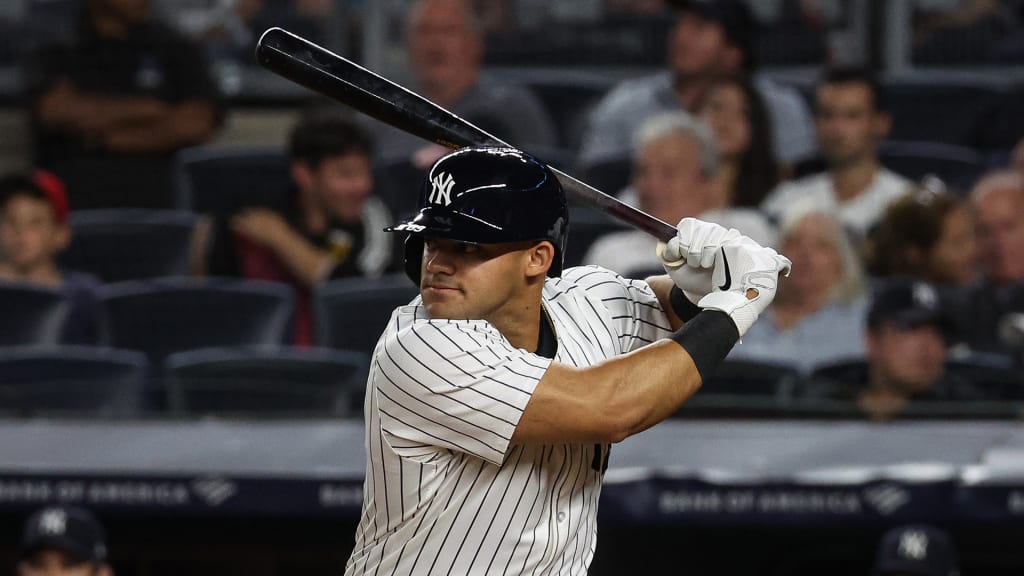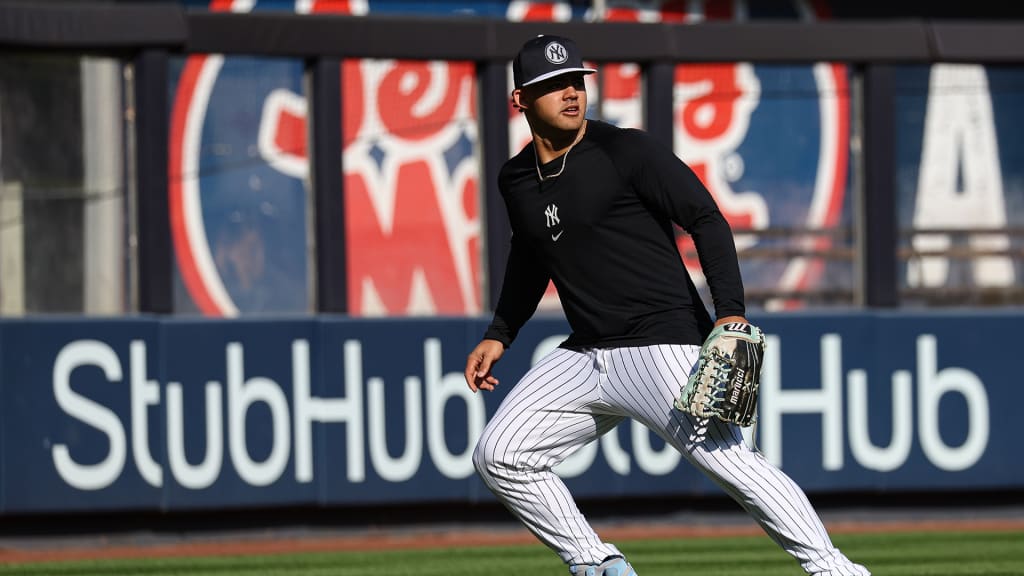
When Cody Bellinger showed up at Yankees camp, he was one of four former MVPs in the room. It was easy to be awed by the sheer level of talent around him. But Bellinger also was amazed by the player whose locker was next to his, a guy with just 87 career at-bats in 26 games at the big league level.
“Man, the talent is through the roof,” Bellinger said of his new teammate, switch-hitting outfielder Jasson Domínguez. “The swing, both sides of the plate, it plays. It’s a really, really good swing. Contact, power -- he’s got a really good approach for a young guy. Watching him work is special; he’s got real special talents.”
Domínguez has been making solid impressions since fans first learned about the Dominican teenager nicknamed “The Martian.” Talent evaluators threw around names such as Mike Trout and Mickey Mantle as comps, and the Yankees signed the 16-year-old to a then-record $5.1 million deal. It’s the sort of hype that can be dangerous; anything less than Triple Crowns and MVP Awards suddenly becomes a disappointment. But to hear the now-22-year-old tell it during an exclusive interview at George M. Steinbrenner Field during Spring Training, those expectations are to be embraced.
Yankees Magazine: A year ago when we were down here, you were rehabbing, hoping to find your way back. I know that last year was more of a struggle than you might have hoped. But how does it feel to be starting fresh, ready to show what you can do over a full year?
Jasson Domínguez: It definitely feels good. It feels good to be here since Day 1, to get to do everything with the guys. I’m back at it. I feel good about it.
YM: How hard is rehab, when you simply can’t do the things that you’re supposed to be able to do?
JD: The first days, it wasn’t too bad, because you see progress every day. But once you feel good and you keep doing the same thing over and over, that’s when it becomes boring. You’re doing the same thing every day. But that’s about it.
YM: How did you spend this past offseason?
JD: I spent one month in the Dominican Republic. But the rest, I was in New Jersey because my family was there.
YM: You show up to Spring Training this year, suddenly, you’re lockering right next to Aaron Judge. Cody Bellinger is on the other side of you. You have No. 24 hanging in your locker instead of a pretty high number. You’re being talked about as a starting left fielder. How valuable is it to know that the team has these high hopes for you and believes that you can accomplish big things?
JD: To hear that from your team, that they believe in you, it gives you a lot of motivation and confidence to do it. Right now, I’m working in left field, learning a new position, and I’m doing my best to win that.

YM: When you spend time with a guy like Judge, what can you gain just by being around him?
JD: Being around a guy like Judge, you can learn about anything. I’m laughing, because he’s a great player, but he’s an even better person than he is a player. Just to be with him and talk about life, about baseball, about everything -- that’s a guy that you definitely want to be around.
YM: One of the things that’s really interesting about baseball clubhouses is the way that cultures mix. In many professions, a kid from the Dominican Republic and another from California aren’t necessarily going to cross paths. But here, you’re brothers, right? You do everything together. How much do you enjoy all the different people you get to be around by being part of a baseball team?
JD: That’s one of the best things for me, the thing that I like most about baseball. Because you get to know a guy from Cuba, from Nicaragua, from Aruba, from different parts of the world. You get to know them. You ask them about their culture, about everything, and you get to learn a lot from them, too.
YM: Speaking of learning, you were around the team throughout the postseason last year; you got onto the field as a pinch-runner, including in Game 1 of the World Series. What did you take from the experience of being part of that World Series journey, even if most of it was just in the clubhouse and the dugout?
JD: I know guys who played their whole life, and they never even got to the playoffs. Just the fact that you’re there -- even if you’re not playing, but you’re there, you see how the postseason feels, how the World Series feels. It was an honor, a big opportunity for me. To be able to be there, you can take in a lot of things, like the pressure, that everything matters, that it’s not about you, it’s about the team. You’re just trying to find a way to win the game. That’s what I take from the experience.
YM: It’s not like you can look back at your World Series at-bats; you didn’t have any. But if the team gets back there this year, how do you think you will have benefited from getting some of the butterflies out last year? Do you think those benefits are real?
JD: One hundred percent. If we get there another time, I already lived the experience. The butterflies and the things that you feel, you’re still going to feel it, but you’re going to know how it feels. You’re going to know how to control that.
YM: You’re such a young player, with so much of your career still ahead of you. But it’s hard to get to the World Series. Like you said, the list of great players who have never played in it is very long. When it’s over and the Dodgers are celebrating on your home field, how hard was that for you personally? And do you tell yourself in those moments, “We’re going to be back?”
JD: It’s a hard feeling because you don’t want to be in second place. You want to win. But I think at the end of the day, that just gives you more hunger when you get there. You want to be able to be No. 1. It’s a hard feeling, and I don’t want to feel that again.
YM: You have been dealing with what I would call an unfair level of pressure since the Yankees first signed you. People were throwing around names like Mickey Mantle and Reggie Jackson and Mike Trout. How did you manage to shut out that noise and focus on doing what you had to do each step of the way?
JD: Like you said, I always heard those names. I heard a lot of Mike Trout. Mickey Mantle. Those guys, they already did what they had to do. They already have their careers. I feel grateful that people think I can be that type of player, and I don’t take that as pressure. It motivates me to work even more to be able to meet those expectations.
YM: It’s funny to look back to January 2020, before we really knew about what COVID would be. I talked to you in the Dominican Republic, on your first day of your first full year with the Yankees. When you look back to that Jasson Domínguez -- braces, barely an idea of what professional baseball would be like -- how much do you think you’ve learned in the past five years?
JD: A lot. As I look at it now, I know that I was just there playing. I wasn’t able to imagine what professional baseball was really like at that point. From that time to where I am right now, it’s a whole different world.
YM: Is this all harder than you expected? I mean, you’ve had struggles; every young player has struggles. There have been things that have gone incredibly well. There have been setbacks. Is this as hard as you expected? Is it harder?
JD: I think there are bad and good moments. I don’t think that it’s too hard that you can’t do it. I just think that everyone has struggles and everyone has their moments. You’re always going to learn something new. Sometimes, you struggle with your swing. Sometimes, you struggle with your arm. They’re just moments, nothing that’s so hard that you can’t do it.

YM: When you are struggling on a big league field, that means that, by definition, you have made the big leagues. How different is that from struggling in the Minors? If you have a rough time in the Minors, you might not get promoted. Your career might stall. But if you struggle in the Majors, there are way more eyes on you.
JD: In the big leagues, everybody’s watching, and you don’t want to make an error. And there’s also the other guys on the team. You can make an error that causes your pitcher to make more pitches than he would have if it weren’t for the error. But I’d rather struggle in the Majors than in the Minors, for sure.
YM: Exactly! It means you’re here.
JD: Yeah, you’re here. But you feel a little embarrassed.
YM: What are the ways that you’ve been working on your defense in left field?
JD: It’s a new position for me. And I’m working on all the angles, all the drills that I have to do to get more used to it. I got to Spring Training early to focus on that. It’s a new position, and you’ve got to go step by step.
YM: How is playing left field different from playing center field?
JD: As a center fielder, you’re basically the boss out there. All the field is yours if you call the ball. Left field, you have to know where your center fielder is. The angles off the bat are a little different. The wall is a little closer.
YM: How confident are you that you will be an excellent left fielder?
JD: I’ve been working on it, and I feel good with my progress. Every day I feel more comfortable.
YM: How excited are you right now about all that’s in front of you? Whether today’s game, or this month, or the season, or the entirety of your career. It’s all out there for you …
JD: It’s definitely exciting. Going to the field with guys like Judge, Bellinger, I get to go out every day and play with those guys, with this team. It’s exciting, and I know that there are a lot of good things that can happen.
This interview has been edited for clarity and length.
Jon Schwartz is the deputy editor of Yankees Magazine. This story appears in the April 2025 edition. Get more articles like this delivered to your doorstep by purchasing a subscription to Yankees Magazine at www.yankees.com/publications.
